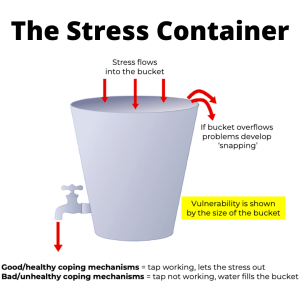We all face stress in our daily lives, both at home and at work. How we handle these challenges depends largely on our coping mechanisms - the strategies we use to manage stress and difficult emotions. But when was the last time you took a closer look at yours?
Understanding Stress and Stressors
Before we delve into coping mechanisms, it's crucial to understand the difference between stress and stressors. Stressors are the events or situations that we perceive as threats to our wellbeing, especially when we feel our resources are inadequate to handle them. Stress, on the other hand, is our body's response to these stressors.
It's important to note that what one person finds stressful, another might view as a manageable challenge. This is because we all have unique perspectives and varying levels of resources to cope with stress.
The Stress Container Model
A helpful way to visualise how stress affects us is through the Stress Container model. Imagine you have a container that collects all the stressors in your life. These might include work pressures, financial concerns, health issues or relationship problems.
The size of your container and how quickly it fills up can vary based on your current resilience levels. When your container overflows, you may experience symptoms like trouble sleeping, difficulty concentrating or feelings of anxiety and overwhelm.
Coping Mechanisms: The Taps on Your Stress Container
Coping mechanisms act like taps on your stress container, helping to release the build-up of stress. These can be both positive and negative, for example:
Positive coping mechanisms:
- Exercise
- Meditation
- Talking to friends
- Engaging in hobbies
Negative coping mechanisms:
- Excessive alcohol consumption
- Smoking
- Overeating
- Isolating yourself
While negative coping mechanisms might provide temporary relief, they often lead to more problems in the long run. It's like adding limescale to your tap - eventually, your container will still overflow.
The Origins and Persistence of Negative Coping Mechanisms
While we often think of negative coping mechanisms as harmful habits we should simply "break," it's crucial to understand that these behaviours often serve - or once served - important purposes in our lives.
Many negative coping mechanisms develop during childhood or adolescence as survival strategies to deal with challenging, and sometimes traumatic experiences. For instance:
- A child growing up in an unstable home might learn to emotionally detach as a way to protect themselves from pain.
- Someone who experienced food insecurity might overeat as an adult, even when they're not hungry, to feel safe and secure.
- A person who grew up in an environment where their feelings were dismissed might turn to substance use to numb difficult emotions.
These coping mechanisms, while potentially harmful in the long term, may have been essential for survival or emotional protection at one point. They helped individuals navigate tough circumstances when healthier options weren't available or known.
As adults, we might intellectually recognise that these behaviours are no longer serving us well. However, they can be incredibly difficult to change because they're deeply ingrained and tied to our sense of safety and survival.

Improving Your Coping Mechanisms
Developing healthier coping mechanisms can help expand your stress container and manage stress more effectively. Here are some steps to get started:
- Self-reflection: Take time to identify your current coping mechanisms, both positive and negative.
- Evaluate effectiveness: Consider how well each mechanism is serving you in the long term.
- Explore alternatives: If you rely on negative coping mechanisms, brainstorm healthier alternatives that could provide similar relief.
- Practice and patience: Adopting new coping strategies takes time. Be patient with yourself as you learn and grow.
- Seek support: Don't hesitate to reach out to a mental health professional for guidance in developing healthier coping mechanisms.
The Role of Anxiety and Trauma
Negative coping mechanisms can often be rooted in anxiety or past trauma. Trauma, especially complex trauma experienced over time, can significantly impact how our brains and bodies respond to stress. What might seem like an "overreaction" to others could be a trauma response triggered by past experiences.
Anxiety, whether stemming from trauma or other factors, can make us feel constantly on edge. In these states, we're more likely to reach for quick fixes - our familiar negative coping mechanisms - rather than healthier but potentially more challenging alternatives.
The Importance of Professional Support
Given the deep-rooted nature of many negative coping mechanisms, professional support is often crucial for making lasting changes. Here's why:
- Safety: A trained professional can help create a safe environment for exploring the origins of these behaviours without retraumatisation.
- Skill Building: Therapists can teach new, healthier coping skills tailored to your specific needs and experiences.
- Underlying Issues: Therapy can address the underlying anxiety, trauma or other mental health concerns that fuel negative coping mechanisms.
- Gradual Approach: Professionals understand that abruptly removing coping mechanisms, even negative ones, can be destabilising. They can help you transition gradually and safely.
- Compassionate Understanding: A good therapist will approach your coping mechanisms with empathy, recognising their historical importance while helping you move towards healthier alternatives.
Remember, seeking help to change long-standing coping mechanisms is a sign of strength, not weakness. It's an investment in your long-term wellbeing and an opportunity to develop a healthier, more resilient relationship with stress.
If you find that your coping mechanisms are significantly impacting your quality of life or if you suspect they're rooted in past experience, don't hesitate to reach out to a mental health professional. With the right support, it's possible to develop new, healthier ways of managing life's challenges while honouring the strength and resilience that got you through tough times in the past.

